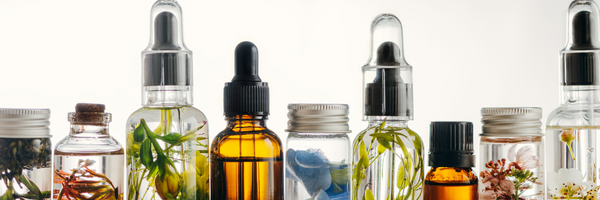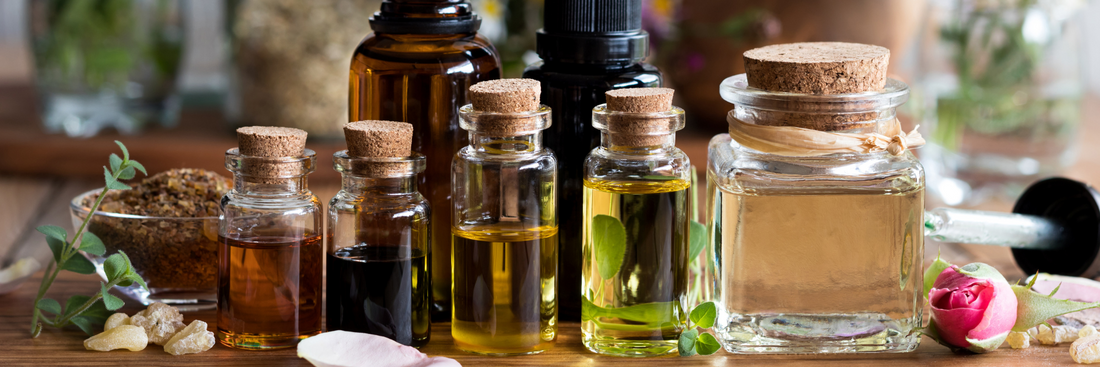Essential oils are powerful to our sensory wellness due to their scent, ability to promote relaxation and sleep, antibacterial properties, and pain-relieving effects. With proper usage and dilution, essential oils can be a natural and effective way to improve our overall well-being. But their power is beyond that.

What are essential oils?
Essential oils are concentrated plant extracts that retain the natural smell and flavor, or “essence,” of their source. [1]

What are they used for ?
Today, essential oils are used in traditional and complementary medicines, aromatherapy, massage therapies, cosmetics, perfumes and food industries. [2]

How do they work?
Olfactory: Inhalation as one of the easiest ways to use essential oils is through Diffusion. Inhalation activates the limbic system through the olfactory nerve, and the effects can be pretty powerful.
Absorption: Using carrier oils such as coconut oil or grapeseed oil to dilute other essential oils (direct application to the skin can be dangerous, professional advisory needed) helps decrease skin sensitivities and increase absorption.
Ingestion: Ingestion of essential oils should only be done under the direction of a qualified professional. [3]

General Benefits of Essential Oils
Relaxation, better sleep, hormone regulation, mood regulation, increased immunity
increased recovery time from illnesses, pain relief, increased energy, improved cognitive function, better digestion, reduce anxiety, alleviation of pain, and more!
Essential Oils and SPD - Olfactory and Sensory Integration
Our sense of smell is one of the most important aspects of sensory integration that aromatherapy awakens and integrates.
A well-balanced olfactory system allows us to appreciate a wide range of foods. In addition to helping bring back long-forgotten memories. A well-balanced olfactory system may also have mood-enhancing effects, depending on the scent.
Children who like exploring their newly developed senses can find some scents very helpful in elevating their moods. Compared to adults, children can associate various smells more readily with favorable or unfavorable emotions.
Aromatherapy is a great non-invasive treatment for children with autism and other sensory integration issues since it may stimulate the senses. Children can benefit from aromatherapy because the flowers and oils have a naturally relaxing effect. [4]
Essential Oils and Autism - Evidence Based Research
Tobik (2021) claims that the medicinal properties of essential oils' chemical makeup can help people with autism in psychological, emotional, and physical ways. Tobik specifically offered a list of the top ten "best" oils along with their stated functions to help reduce problematic behaviors (such as physical aggression, rage, anxiety, attention deficit, hyperactivity, sensory overload, sleep problems, and meltdowns) in people with autism. [5]
Among these oils are frankincense, ylang-ylang, bergamot, lavender, mandarin, peppermint, vetiver, sandalwood, cedarwood, and chamomile.
Frankincense might strengthen immune systems and assist those with autism and ADHD in maintaining focus.
Sandalwood oil might help kids with autism since it has "relaxing and calming effects."
Jameson (2018) suggested (the application of essential oils like) that ylang-ylang may be effective in managing emotional outbursts and aggression.
Martinez (2021) suggested that diffusing essential oils (i.e., aromatherapy) along with mindfulness exercises may help children with autism maintain good, or appropriate, behavior.
Ibarra (2019) and Shreya (2022) suggested that aromatherapy may decrease stereotypic behaviors occurring in response to overstimulating situations (“sensory overload”; e.g., large crowds, loud noises, etc.). These suggestions seem ideal, affordable, and effective procedures that are easily accessible.

Studies on essential oils’ effects
The effects of essential oils on the nervous system have been widely studied in every region around the world.
-Lavender oil showed a sedative effect and improved objective sleep quality.
-Peppermint and coffee showed a stimulating effect.
-Lavender, rosemary, bergamot, eucalyptus, rose, yuzu, lemon, Meniki, Hinoki, Juniperus phoenicea gum extract, Copaifera officinalis (Balsam Copaiba) resin, Aniba rosaeodora (Rosewood) wood oil, Juniperus virginiana oil, grapefruit oil, and petitgrain revealed autonomic nervous system (ANS) activity modification. (The autonomic nervous system is a component of the peripheral nervous system that regulates involuntary physiologic processes including heart rate, blood pressure, respiration, digestion, and sexual arousal.)
-A massage with lavender and geranium oils also affected the ANS by reducing heart rate and blood pressure after the massage.
-Peppermint, rosemary, grapefruit, and cinnamon oils improved vigilance, alertness and arousal.
-Rosemary essential oil improved cognition.
-Spearmint and peppermint essential oils modulated performance during a demanding cognitive task and reduced mental fatigue during a prolonged cognitive task.
-Petitgrain essential oil could improve performance in the workplace when added to an aroma diffuser in the work room.
-Lavender, chamomile, bergamot, sweet orange, anise, geranium, and mountain pepper reduced depression in the elderly, postpartum women, restless patients, breast cancer patients, irritable bowel syndrome patients, mixed anxiety and depressive disorder, and residents in a long-term care unit. [6]
Tips To Make The Most Out of Essential Oils
- Choose the best: Pick up only organic, certified brands.
- One at a time: It is important to use one at a time to actually observe the benefits and improvements with each one of them.
- Do Not Use Them If Pregnant/Breastfeeding
- Be Careful with Sensory Sensitivity: Dilute the oils to reduce their smell.
How is your experience with essential oils? Share with us your thoughts?
Learn more sensory facts on our social pages @avid sensory wellness
If you have any questions please feel free to reach out to us here or email us at avidsensorywellness@gmail.com
Feel free to check our selection of essential oils, locally available in Canada by Green Valley Aromatherapy. https://avidsensorywellness.com/collections/green-valley-aromatherapy
Sources:
[1] https://www.healthline.com/nutrition/what-are-essential-oils
[2] https://www.ncbi.nlm.nih.gov/pmc/articles/PMC10180368/
https://www.ncbi.nlm.nih.gov/pmc/articles/PMC5198031/

